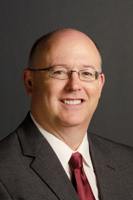

Even years before he was diagnosed with cancer, which later contributed to his dementia, my stepmom got a call from Dad which was foreboding.
Dad, who was in his truck and within the small city and county where he was born and raised, told her, “Honey, I know where I am. I know where the house is. But I don’t know how to get there from here.” She got him home.
Whether we admitted it or not, we knew "home" would never be the same.
It was in that home, years later, when Dad said to me, with more love and hurt in his eyes than most can imagine, “Now I know you’re my son, but which one are you?”
I had lots of anger about Dad's dementia, probably because I thought it was a better emotion than fear. My wife noticed a tremendous decrease in my anger one day and asked what was different.
“He’s not the Dad I had, but he is the Dad I have,” I answered.
I was blessed with at least 18 months of a new attitude toward dementia which was stealing and replacing Dad. He’s gone now, I miss him, but there are lessons here that affect us all personally and politically. Dementia isn’t a party problem. It is a human problem. It is a problem that creates more problems.
“I’m not a good driver like I used to be,” Dad said to me as I was driving him to town one Saturday while visiting them.
We had known his driving was getting worse beyond just forgetting where he was. We had, without him knowing, had a discussion about if and when it would be best to take his license.
“It’s really just your attention Dad,” I said because I didn’t really know what else to say but the truth. “I’ve sat behind you when you drive and you’ll look left for three or four seconds, at the road for a second, and then look right for three or four seconds. Everything but your primary responsibility as a driver interests you.” I was afraid his curiosity would kill more than the cat one day.
That day never came because Dad gave up his driver’s license without being asked.
He knew he could no longer lead himself to places without facing confusion or possibly hurting himself or someone else. This relieved me because I remembered my friend’s story.
His mother pulled out in front of a semi on a major Louisiana highway by her home. The habit of looking left and right before pulling out was still there. The ability to remember what she saw was not. She died, the trucker was severely injured, and it is one of many tragedies in life often unreported and possibly connected with dementia.
People with dementia need help. Dad knew he would need help.
Some are weak and defenseless as a baby. Others retain their strength and might be even harder to help. My granddaddy was the strong type and once forgot who grandmother was. He chased her around the house with a knife wanting to know why she was in his house. She put him under care elsewhere because his strength made him harder to help.
Whether strong or weak, people with dementia still need help.
In many ways, they are defenseless because they can so easily be taken advantage of by those who might not care while claiming they do. Elder abuse and fraud are too easily accomplished when someone has dementia. I remember often Dad would get to the table and claim not to be hungry. Yet, like a two-year-old, time and distraction would mean he would often eat. The same can be done with paperwork and important issues.
As Dad got worse, he would often ask my stepmom, “What’s going to happen to me if something happens to you?”
I see how countries with socialized medicine treat the elderly and people with mental problems. Methodical and diabolical forced euthanasia chronicle their demented plan for the defenseless. There are several places with footholds here in America, too. It is cruelty cloaked by supposed kindness.
The cruelty of humankind is juxtaposed to the kindness I saw in my stepmom with Dad. She worked hard to take care of him and would not dare send him to a home. The cancer treatments had weakened him, and even when he was in remission had affected his stamina. Getting up from his recliner to make the 30 foot walk to the dinner table would leave him out of breath.
Yet, in his heart and in the air of their home, was a gift that I thank God for even now. He would often sit in his recliner and sing hymns for 15 to 20 minutes. Some, like “Hallelujah Square” and “Sorry, I Never Knew You,” I had never heard of before. Others were easily recognized. He had blessed assurance since he would cling to the old rugged cross so that he could sing “I’ll Fly Away.”
I’m sad I have no simple answers. Dementia is one of the most feared possibilities compared to many diseases people might have.
But for those who can still think, reason, and make choices, what we need to do is fear God and come to a restored relationship through the crucifixion and resurrection of Jesus Christ. Otherwise, when we fly away, we’ll hear, “Sorry, I never knew you” which the Bible warns us of in Matthew 7:21-23. It is only through Jesus can we have blessed assurance of our eternity. God help us all hear and act on these words sooner rather than later.

